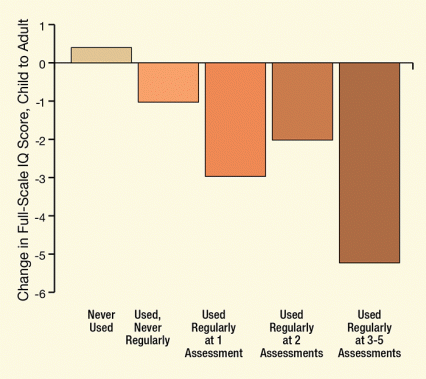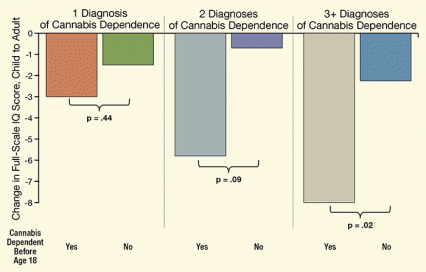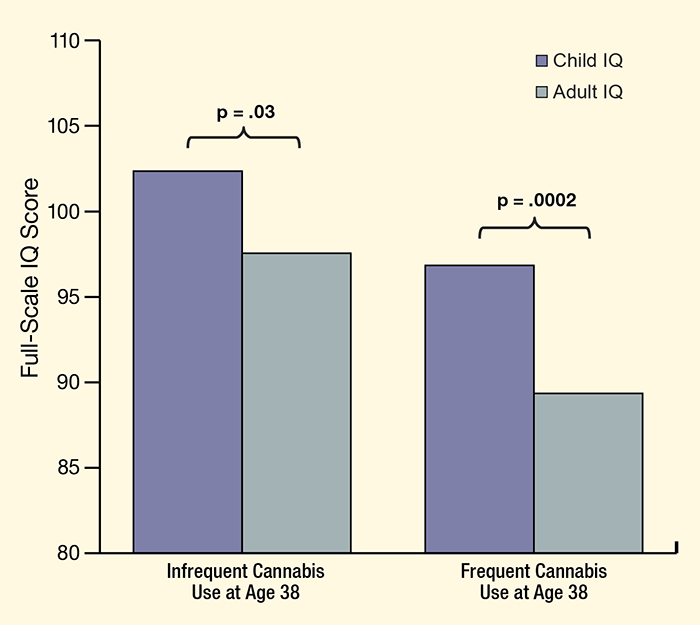 In this video, Dr. Madeline Meier discusses her study of marijuana and IQ.
In this video, Dr. Madeline Meier discusses her study of marijuana and IQ.Regular cannabis use that starts in adolescence strips away IQ, a NIDA-supported 25-year study of 1,000 individuals suggests. Study participants who initiated weekly cannabis use before age 18 dropped IQ points in proportion to how long they persisted in using the drug, while nonusers gained a fraction of a point.
Persistent cannabis users’ cognitive difficulties were evident to friends and family and measurable on psychological tests. Moreover, among adolescent-onset users, quitting or cutting back did not fully eliminate the IQ loss. Drs. Madeline Meier, Terrie Moffitt, Avshalom Caspi, and colleagues at Duke University, King’s College London, and the University of Otago, New Zealand, say their findings accord with other data that have suggested that cannabis use may harm the developing brain.
Cannabis Use Correlates With Cognitive Decline
The study participants were 1,037 people who were born in 1972 and 1973 in Dunedin, New Zealand, and enrolled as infants in the longitudinal Dunedin Multidisciplinary Health and Development Study. Their families represented the range of socioeconomic statuses in that region.
Dr. Meier and her team tested each participant’s IQ four times up to age 13; asked about past-year cannabis use at ages 18, 21, 26, 32, and 38; and assessed IQ again at age 38. The researchers used the Wechsler Intelligence Scale for Children-Revised (WISC-R) and the Wechsler Adult Intelligence Scale-IV (WAIS-IV) to assess IQ in childhood and adulthood, respectively. The team averaged each participant’s four childhood IQ scores and compared that number with his or her score at age 38.
 Figure 1. Persistent Cannabis Users Show IQ Decline Individuals who reported regular (more than 4 days a week) cannabis use in more assessments (out of 5, conducted over 20 years) incurred greater average declines in IQ between childhood and age 38.
Figure 1. Persistent Cannabis Users Show IQ Decline Individuals who reported regular (more than 4 days a week) cannabis use in more assessments (out of 5, conducted over 20 years) incurred greater average declines in IQ between childhood and age 38.
 Figure 2. Cannabis Dependence: Age at First Diagnosis Affects Impact on IQ The relationship between IQ decline and cannabis dependence was stronger among individuals who were first diagnosed before age 18 than among those who were first diagnosed after age 18.
Figure 2. Cannabis Dependence: Age at First Diagnosis Affects Impact on IQ The relationship between IQ decline and cannabis dependence was stronger among individuals who were first diagnosed before age 18 than among those who were first diagnosed after age 18.
Changes in the participants’ IQ scores from childhood to age 38 correlated with the number of assessments at which they reported having used cannabis regularly (at least 4 times weekly). Those who reported regular use at 1 of the 5 drug assessments scored 3 IQ points lower, on average, at age 38 than they had in childhood; the scores of those who reported regular use at 3 or more assessments fell 5 points (see Figure 1). In contrast, the scores of participants who reported no cannabis use throughout the study increased slightly. The researchers found similar correlations between participants’ IQ trajectories and the number of assessments in which they met diagnostic criteria for cannabis dependence.
When researchers matched adolescent-onset and adult-onset cannabis users with equally persistent use, they saw greater IQ declines among the adolescent-onset users (see Figure 2). In fact, whereas individuals who were dependent on cannabis before age 18 and in a total of 3 or more assessments lost 8 IQ points, on average, individuals who developed dependence as adults did not exhibit IQ declines in relation to their cannabis dependence.
The 8-point decline observed among the most persistent adolescent-onset users would move an individual who started at the 50th percentile with an IQ of 100 to the 29th percentile, says Dr. Meier. Such a drop could put a person at a disadvantage compared with his or her peers in terms of ability to get an education or find and hold a good job, she says.
Dr. Meier and colleagues also assessed a variety of specific mental functions at age 38, such as memory and processing speed, using a battery of tests. Dr. Moffitt notes that although she and her colleagues had expected to see impairments in memory, “all kinds of functions were impaired, across the board. Virtually every kind of brain function was involved: memory, processing speed, executive functions, verbal skills, attention, and so forth.”
These deficits affected participants’ daily functioning to an extent that was noticeable to people who knew them well. The researchers asked informants chosen by the participants themselves to provide information on the participants’ mental capacities at age 38. The informants reported more memory and attention problems among cannabis users than among non-users who had started out with the same IQs in childhood.
Cannabis May Harm the Developing Brain
Dr. Meier and colleagues’ findings suggest that IQ is particularly vulnerable to cannabis exposure in adolescence:
- Only adolescent-onset users evidenced significant IQ decline.
- Among all the study participants who initiated weekly cannabis use before age 18, there was little difference in average IQ loss between those who had reduced or stopped their use of the drug for a year or more by age 38, versus those who continued to use frequently (see Figure 3).
 Figure 3. Persistent Cannabis Users Who Quit May Not Fully Regain Lost IQ Among 36 individuals who initiated cannabis use as adolescents and reported use in at least 2 of 5 assessments, 17 reported infrequent use of the drug during the year preceding their final assessment at age 38. These individuals still had IQ scores lower than their childhood scores—although the decline was less than was found among those who continued to use the drug frequently.
Figure 3. Persistent Cannabis Users Who Quit May Not Fully Regain Lost IQ Among 36 individuals who initiated cannabis use as adolescents and reported use in at least 2 of 5 assessments, 17 reported infrequent use of the drug during the year preceding their final assessment at age 38. These individuals still had IQ scores lower than their childhood scores—although the decline was less than was found among those who continued to use the drug frequently.During puberty, neurons and neurotransmitter systems mature and link up into refined neural networks. “We hypothesize that cannabis use may interrupt these changes. Animal studies also suggest that this is the case,” Dr. Meier says. To strengthen this hypothesis, future imaging studies might look for structural changes or functional connectivity problems in the brains of adolescent cannabis users.
Dr. Meier and Dr. Moffitt and colleagues ruled out several potential alternative explanations for the observed correlations between cannabis and IQ decline. In a series of analyses, they showed that the correlation still remained after adjusting for participants’ cannabis use in the last week before IQ testing, tobacco use, and dependence on alcohol and other drugs.
Fewer cannabis users than non-users in the study were educated beyond high school, and studies have correlated education with improvements in IQ. However, looking only at the study participants who had a high school diploma or less, the persistent cannabis users still showed greater IQ declines. Dr. Meier and Dr. Moffitt and colleagues suggest that cannabis use and fewer years of school could be reciprocally related. Effects of cannabis on the brain could result in poor academic performance and school dropout, which might produce further declines in brain functioning.
In response to suggestions from other researchers, the team examined whether the participants’ socioeconomic status and personality factors might explain their results. These analyses disclosed little impact of these factors on the cannabis-IQ correlation.
Are the Changes Reversible?
The researchers say that further research is needed to learn whether cannabis-related impairments in the brain are reversible. However, they point to the current study’s finding that stopping or reducing use did not completely restore IQ declines among adolescent-onset users.
“This study is important because we have precious little evidence on whether or not drug use leads to enduring changes in cognition,” says Dr. Steven Grant, chief of the Clinical Neurosciences Branch within NIDA’s Division of Clinical Neuroscience and Behavioral Research. “The issue is critical, because at stake are the individual’s ability to benefit from current substance abuse therapies and recoup his or her full potential for a rich, fulfilling life.”
This study was supported by NIH grants: AG032282, MH077874, and DA023026.
Sources
Meier, M.H.; Caspi, A.; Ambler, A.; Harrington, H.; Houts, R.; Keefe, R.S.E.; McDonald, K.; Ward, A.; Poulton, R.; and Moffitt, T. Persistent cannabis users show neuropsychological decline from childhood to midlife. Proceedings of the National Academy of Sciences 109(40):E2657–E2664, 2012. Full Text
Moffitt, T.E.; Meier, M.H.; Caspi, A.; and Poulton, R. Reply to Rogeberg and Daly: No evidence that socioeconomic status or personality differences confound the association between cannabis use and IQ decline. Proceeding of the National Academy of Sciences 110(11):E980-E982, 2013. Abstract
